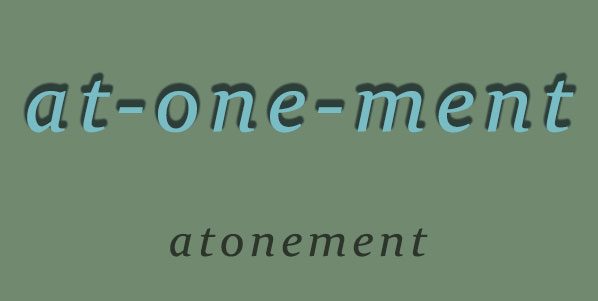Over the last four or five years I have found myself wondering deeply about my understanding of the many issues surrounding ‘sin’ and ‘salvation.’ It has been a long process. There were several false starts but it really got going when one of my lecturers asked ‘What if God just forgave sins?’ Good question. What if he just did?

But perhaps a deeper question to ask might be ‘what is sin?’ When my children ‘sin’ against me (just park that word for the moment) I do not require a punishment in order to forgive them. Sometimes they needed punishing, but that was more as a deterrent to stop repeat dangerous or awkward behaviour. I certainly never asked them for any form of reparation.
So…
One issue with a look into a great doctrine like ‘soteriology’, the study of salvation, is careful framing of the question. If you don’t get the question right, then you can end up in an awful mess – as perhaps perfectly demonstrated by the Brexit debacle. I find myself with a cluster of questions; every time I settle on asking one another opens up. It is like going into a huge rabbit warren – it is easy to lost in the twists and turns of the half light. Here are just a few of the ones I have been asking:
- Just what is sin?
- In what sense does it separate me from God?
- Why does it need forgiving?
- Assuming it does need forgiving what was the role of Jesus in this?
- Why does blood seem to be integral to forgiveness?
- How can I owe a ‘debt to God’?
- How can I be said to ‘sin against God?’
- And what of the community elements – what is sometimes called ‘corporate’ sin?
You get the idea – and that’s just for starters. Elements of our faith are meant to be experienced rather than understood and it is important to realise our rational limitations. Not everything bows down to the scientific method, and neither should it. Imagine how two dimensional our knowledge and experience of the divine would be if we understood it all. The other side of this coin is that it is our joy to wrestle with these issues since they ultimately lead us to mediate on the transcendence and immanence of God.
‘Come let us reason together’ says God to Isaiah, interestingly in the context of forgiveness ‘though your sins be as scarlet they shall be as white as snow.’ So that is what I have set out to do, to look a little more deeply into ‘Soteriology’ in an attempt to more fully understand this mystery. What I have quickly learnt is that I am in very good company. Theologians since the year dot have been asking the same questions as me, though they put them much more eloquently. And what really surprised me is that they have not come to any clear conclusions.
I was ‘born and bred’ a protestant evangelical and as such inherited a lot of theology from sermons, youth leaders and worship songs. There seems to me to be a mutually agreed, and never questioned, version of how salvation works, what you might call a ‘standard evangelical model’. (ta da) In my understanding the ‘standard evangelical model’ goes something like this. See how many assumptions you can find.
The Standard Model
God created everything perfect and set up humans as his imagers (whatever that means) to ‘subdue’ and have ‘dominion’ over the nearly formed paradise. Man and woman sinned which introduced the curse of death and separation from God (and in some versions handed over authority of the earth to the satan). This sin introduced a ‘break’ in the relationship between God and humans (and everything else too). The effects of sin are clear.
Sins required forgiveness in order to close the gap. As sinners we have offended God or become debtors to him. We have fallen short of his plan for us, naturally this has made him angry/wrathful. This offense/debt/shortfall/wrath could only be forgiven by something dying. The just desserts/punishment of our sin is that we die.
The only way that this problem could be sorted was for God’s son, Jesus, to die in our place. So God sent him to earth where he lived a perfect life. Ultimately the people where Jesus lived could not handle him, so they conspired to crucify him. On the cross Jesus took our sin into himself – somehow. All of God’s anger was poured out on him as all the violence that sin wreaks in our lives was put on him. At this point the debt was paid, the separation between humans and God was bridged and eternal life was made available since sin is now forgiven.
So there it is. There are of course many variations of this ‘theory of atonement’. Perhaps I have parodied it somewhat? Maybe. But if you ask around you’ll hear something resembling these ideas.
My plan is to unpack this a bit in our lifegroup. So, next up, will be a look at our own stories of ‘salvation’.



